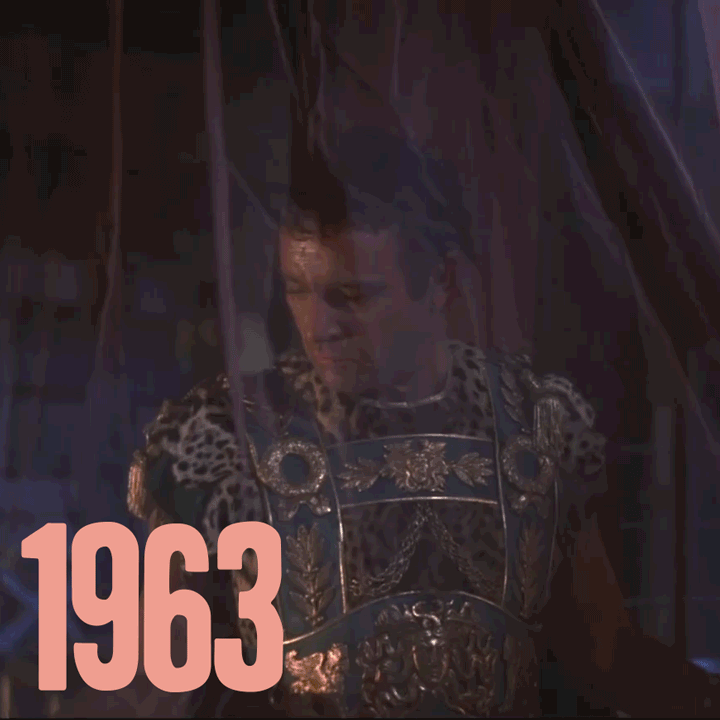GROSS/54 1963 - Cleopatra - unforgiveable time crime
You are now 243 minutes closer to death. Sorry.
GROSS is every year’s top-grossing movie, since 1913, reviewed.
CLEOPATRA, director JOSEPH L. MANKIEWICZ, cast ELIZABETH TAYLOR, RICHARD BURTON, REX HARRISON, production TWENTIETH CENTURY-FOX, 1963, 243 MINUTES.
I’m not writing 2,000 words about Cleopatra. I mean I probably should: it’s the last epic, after all, the monstrosity that somehow killed off the whole form, triggered the end of the studio system and brought into being ‘the New Hollywood’ all in one go. But honestly, if you’ve been here a while you’ll know how many hours of my life I’ve now had to give to these over-engineered cinema dreadnoughts. So what I’ve decided to go with a gimmick and write 243 words about this 243-minute epic.
There’s no maximum length for a movie. How could there be? Even an infinitely long movie could still be a bit longer, right? Just add a minute. The Infinity+1 Cut. And the passage of time in a movie is real, related literally to the passage of time in the world. They’re the same thing. I’m obviously not talking about time as represented in a movie, where it can be folded, compressed, stretched, reordered and so on. I’m talking about time spent in the movie theatre. When you spend two hours at the cinema you’ll come outside and find you’ve lost two hours from your evening. Plus all the milling around beforehand and the trailers. It’s brutal. A movie - any movie - will ask of you an appreciable fraction of your life, an amount of time that has, bluntly - by the time you’ve got your coat on and found an Uber - moved you a meaningful nudge closer to death. And, as you get older, that fraction can only get bigger.
INTERMISSION
Of course, this doesn’t usually trouble us because we’re caught up in the action or the joy of the thing. But there are exceptions. Movies that make the loss of time all too evident, that steal your whole evening and then laugh in your face about it. Cleopatra, for instance: an unforgivable crime. Four hours and twenty-three minutes of Elizabeth Taylor vamping and pouting, Richard Burton sulking and flouncing, Rex Harrison gurning ineffectively. It’s leaden, it murders time. It’s too much. At one point Taylor, all in gold, complacently winks during one of several vast and incomprehensible ceremonials, somehow compressing this movie’s epic failure of wit into a single misplaced gesture. I wanted to stand up and shout “fuck you! I want my four hours back.”
This movie was originally intended to be released in two, three-hour parts. Still out there somewhere is Mankiewicz’s unreleased six-hour mega-edit. Pray you are dead before someone decides to put it on.
The infinity thing also works for hotels.
Cleopatra is on Amazon Prime and there’s a Blu-Ray, although I can’t find the the recently-restored version anywhere. Save yourself the time, do a crossword or something.
Time is not incidental to the movies, of course. It’s right there, wound into the artform. It’s present at other levels too: in the experience of the finished article itself and, as Siegfried Kracauer tells us, it’s the backdrop against which film - and all of human culture for that matter - plays out. Even the movies can’t dodge the longue durée.
The gif at the top is from one of the more ridiculous scenes in the movie. Richard Burton’s Mark Antony is thwarted (and slightly confused) by the diaphonous net curtain hanging around Cleopatra’s vast, quadruple-Queen-sized bed. It’s so Morecambe and Wise it’s not true. Perhaps it was lifted from one of the plays wot Ernie wrote.
Cleopatra has an intermission, as you’d expect, and this intermission has its own music, for you to listen to if you decide to stay in the auditorium and not pop out for a tub of Cherry Garcia. There’s a Canadian web site that reviews movie intermissions and it’s still, surprisingly, doing good business. The intermission is obviously back - along with the over-long epic movie, presumably. Recent movies to offer a formal break of this kind include: Oppenheimer, Anatomy of a Fall, The Brutalist and Wicked, part one. Here, I’ve reviewed a number of movies long enough to require an intermission. Gone with the Wind, obvs, but also the fabulous 1927 Napoléon, (which has two) and, obviously, all the big, stupid epics (some of them, including Cleopatra, also offer overtures which, I have to say, are the ultimate vanity. Just run the first reel!).




